COMPILED FROM THE COMPLETE WORKS OF SWAMI VIVEKANANDA
What is Education
Education is not the amount of information that is put into your brain and runs riot there, undigested all your life. We must have life-building, man-making, character-making, assimilation of ideas. If you have assimilated five ideas and made them your life and character, you have more education than any man who has got by heart a whole library. If education were identical with information, the libraries would be the greatest sages in the world and encyclopaedias the rishis
The end of all education, all training, should be man-making. The end and aim of all training is to make the man grow. The training by which the current and expression of will are brought under control and become fruitful, is called education. What our country now wants are muscles of iron and nerves of steel, gigantic wills which nothing can resist, which can penetrate into the mysteries and secrets of the universe and will accomplish their purpose in any fashion, even if it meant going down to the bottom of the ocean, meeting death face to face. It is man-making religion that we want. It is man-making theories that we want. It is man-making education all round that we want.
All knowledge therefore, secular or spiritual, is in the human mind. In many cases it is not discovered, but remains covered, and when the covering is being slowly taken off, we say ‘we are learning’, and the advance of knowledge is made by the advance of this process of uncovering. The man from whom this veil is being lifted is the more knowing man; the man upon whom it lies thick is ignorant; and the man from whom it has entirely gone is all-knowing, omniscient. Like fire in a piece of flint, knowledge exists in the mind; suggestion is the friction which brings it out. All knowledge and all power are within. What we call powers, secrets of Nature, and force are all within.
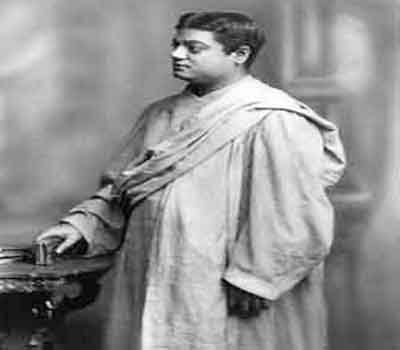
How to Learn
There is only one method by which to attain knowledge, that which is called concentration. The very essence of education is concentration of mind. From the lowest man to the highest yogi, all have to use the same method to attain knowledge. The chemist who works in his laboratory concentrates all the powers of his mind, brings them into one focus, and throws them on the elements; the elements stand analysed, and thus his knowledge comes. The astronomer concentrates the powers of his mind and brings them into one focus; and he throws them on to objects through his telescope; and stars and systems roll forward and give up their secrets to him. So it is in every case: with the professor in his chair, the student with his book, with every man who is working to know.
The more the power of concentration, the greater the knowledge that is acquired. Even the lowest shoeblack, if he gives more concentration, will black shoes better. The cook with concentration will cook a meal all the better. In making money, or in worshipping God, or in doing anything, the stronger the power of concentration, the better will that thing be done. This is the one call, the one knock, which opens the gates of Nature, and lets out floods of light.
The power of concentration is the only key to the treasure-house of knowledge. In the present state of our body we are much distracted, and the mind is frittering away its energies upon a hundred things.
To me the very essence of education is concentration of mind, not the collection of facts. If I had to do my education once again, I would not study facts at all. I would develop the power of concentration and detachment, and then with a perfect instrument, collect facts at will.
Positive Thoughts Make a Great Character
I beg you to understand this one fact, no good comes out of the man who day and night thinks he is nobody. If a man day and night thinks that he is miserable, low and nothing, nothing he becomes. If you say ‘I am, I am’, so shall you be. That is the great fact you ought to remember. We are children of the Almighty, we are sparks of the infinite, divine fire. How can we be nothings? We are everything, ready to do everything; we can do everything.
The character of any man is but the aggregate of his tendencies, the sum total of the bent of his mind. As pleasure and pain pass before his soul, they leave upon it different pictures, and the result of these combined impressions is what is called a man’s character. We are what our thoughts have made us. Each thought is a little hammer blow on the lumps of iron which our bodies are, manufacturing out of it what we want it to be. Words are secondary. Thoughts live; they travel far. And so take care of what you think.
If a man thinks good thoughts and does good work, the sum total of these impressions will be good and they in a similar manner will force him to do good in spite of himself. When a man has done so much good work and thought so many good thoughts, there is an irresistible tendency in him to do good. Even if he wishes to do evil, his mind, as the sum total of his tendencies, will not allow him to do so. He is completely under the influence of the good tendencies. When such is the case, a man’s good character is said to be established. If you really want to judge the character of a man, look not at his great performances. Watch a man do his most common actions; those are indeed the things which will tell you the real character of the great man. Great occasions rouse even the lowest of human beings to some kind of greatness, but he alone is really great whose character is great always—the same wherever he be.
When a large number of these impressions is left on the mind, they coalesce and become a habit. It is said, ‘Habit is second nature.’ It is first nature also and the whole nature of man. Everything that we are is the result of habit…. That gives us consolation because, if it is only habit, we can make it and unmake it at any time. The only remedy for bad habits is counter habits. All the bad habits can be controlled by good habits. Go on doing good, thinking holy thoughts continuously. That is the only way to suppress base impressions. Never say any man is hopeless, because he only represents a character, a bundle of habits, which can be checked by new and better ones. Character is repeated habits and repeated habits alone can reform character.
How to Face Life
We commit mistakes because we are weak, and we are weak because we are ignorant. Who makes us ignorant? We ourselves. We put our hands over our eyes and weep that it is dark. Take the hands away and there is light. The light exists always for us, the self-effulgent nature of the human soul. Do you not hear what modern scientific men say? What is the cause of evolution? Desire. The animal wants to do something but does not find the environment favourable, and therefore develops a new body. Who develops it? The animal itself: its will. Continue to exercise your will and it will take you higher. The will is almighty. If it is almighty, you may say: why cannot I do everything? But you are thinking only of your little self. Look back on yourself from the state of the amoeba to the human being; who made all that? Your own will. Can you deny that it is almighty? That which has made you come up so high, can make you go higher still. What you want is character, strengthening of the will.
Physical weakness is the cause of at least one-third of our miseries. We are lazy; we cannot combine. We speak of many things parrot-like but never do them. Speaking and not doing has become a habit with us. What is the cause? Physical weakness. This sort of weak brain is not able to do anything. We must strengthen it. First of all our young men must be strong. Religion will come afterwards. Be strong, my young friends, that is my advice to you. You will be nearer to Heaven through football than through the study of the Gita. You will understand Gita better with your biceps, your muscles, a little stronger. You will understand the mighty genius and the mighty strength of Krishna better with a little strong blood in you. You will understand the Upanishads better and the glory of the Atman, when your body stands firm on your feet and you feel yourselves as men.
The ideal of all education, all training, should be this man-making. But, instead of that, we are always trying to polish up the outside. What use polishing up the outside when there is no inside? The end and aim of all training is to make the man grow. The man who influences, who throws his magic, as it were, upon his fellow-beings, is a dynamo of power, and when that man is ready, he can do anything and everything he likes: that personality put upon anything will make it work.
We also know that the greatest power is lodged in the fine, not in the coarse. We see a man take up a huge weight, we see his muscles swell, and all over his body we see signs of exertion, and we think the muscles are powerful things. But it is the thin thread-like things, the nerves, which bring power to the muscles; the moment one of these threads is cut off from reaching the muscles, they are not able to work at all. These tiny nerves bring the power from something finer still—thought, and so on. So, it is the fine that is really the seat of power. Of course we can see the movements in the gross; but when fine movements take place, we cannot see them. When a gross thing moves, we catch it, and thus we naturally identify movement with things which are gross. But all the power is really in the fine. We do not see any movement in the fine, perhaps because the movement is so intense that we cannot perceive it. But if by any science, any investigation, we are helped to get hold of these finer forces which are the cause of the expression, the expression itself will be under control. There is a little bubble coming from the bottom of a lake; we do not see it coming all the time, we see it only when it bursts on the surface; so, we can perceive thoughts only after they develop a great deal, or after they become actions. We constantly complain that we have no control over our actions, over our thoughts. But how can we have it? If we can get control over the fine movements, if we can get hold of thought at the root, before it has become thought, before it has become action, then it would be possible for us to control the whole. Now, if there is a method by which we can analyse, investigate, understand and finally grapple with those finer powers, the finer causes, then alone is it possible to have control over ourselves, and the man who has control over his own mind assuredly will have control over every other mind. That is why purity and morality have been always the object of religion; a pure, moral man has control of himself. And all minds are the same, different parts of one Mind. He who knows one lump of clay has known all the clay in the universe. He who knows and controls his own mind knows the secret of every mind and has power over every mind.
Place of Religion in Education
Religion is the innermost core of education. I do not mean my own or any one else’s opinion about religion. The true eternal principles have to be held before the people.
The old religions said that he was an atheist who did not believe in God. The new religion says that he is the atheist who does not believe in himself. But it is not selfish faith. It means faith in all because you are all. Love for yourself means love for all, love for animals, love for everything, for you are all one. It is the great faith which will make the world better. The ideal of faith in ourselves is of the greatest help to us. If faith in ourselves had been more extensively taught and practised, I am sure a very large portion of the evils and miseries that we have would have vanished. Throughout the history of mankind if any motive power has been more potent than another in the lives of great men and women, it is that faith in themselves. Born with the consciousness that they were to be great, they became great.
Infinite strength is religion. Strength is goodness, weakness is sin. All sins and all evil can be summed up in that one word: weakness. It is weakness that is the motive power in all evil-doing. It is weakness that is the source of all selfishness. It is weakness that makes man injure others.
But no scriptures can make us religious. We may study all the books that are in the world, yet we may not understand a word of religion or of God. We may talk and reason all our lives, but we shall not understand a word of truth until we experience it ourselves. You cannot hope to make a man a surgeon by simply giving him a few books. You cannot satisfy my curiosity to see a country by showing me a map. Maps can only create curiosity in us to get more perfect knowledge. Beyond that they have no value whatever. Temples and churches, books and forms are simply the kindergarten of religion, to make the spiritual child strong enough to take the higher steps. Religion is not in doctrines or dogmas, nor in intellectual argumentation. It is being and becoming. It is realisation.
We may be the most intellectual people the world ever saw and yet we may not come to God at all. On the other hand, irreligious men have been produced from the most intellectual training. It is one of the evils of western civilization—intellectual education alone without taking care of the heart. It only makes men ten times more selfish. When there is conflict between the heart and the brain, let the heart be followed. It is the heart which takes one to the highest plane, which intellect can never reach. It goes beyond the intellect and reaches what is called inspiration. Always cultivate the heart. Through the heart the Lord speaks.
How to Avoid Failure
Our great defect in life is that we are so much drawn to the ideal, the goal is so much more enchanting, so much more alluring, so much bigger in our mental horizon, that we lose sight of the details altogether.
But whenever failure comes, if we analyse it critically, in ninety-nine per cent of cases we shall find that it was because we did not pay attention to the means. Proper attention to the finishing, strengthening, of the means, is what we need. With the means all right, the end must come. We forget that it is the cause that produces the effect; the effect cannot come by itself; and unless the causes are exact, proper and powerful, the effect will not be produced. Once the ideal is chosen and the means determined, we may almost let go the ideal, because we are sure it will be there, when the means are perfected. When the cause is there, there is no more difficulty about the effect, the effect is bound to come. If we take care of the cause, the effect will take care of itself. The realisation of the ideal is the effect. The means are the cause: attention to the means, therefore, is the great secret of life.
That man alone will be able to get the best of nature, who having the power of attaching himself to a thing with all his energy, has also the power to detach himself when he should do so. The difficulty is that there must be as much power of attachment as that of detachment. There are men who are never attracted by anything. They can never love, they are hard-hearted and apathetic; they escape most of the miseries of life. But the wall never feels misery, the wall never loves, is never hurt; but it is the wall, after all. Surely it is better to be attached and caught, than to be a wall. Therefore the man who never loves, who is hard and stony, escaping most of the miseries of life, escapes also its joys. We do not want that. That is weakness, that is death. That soul has not been weakened that never feels weakness, never feels misery. That is a callous state. We do not want that.
At the same time, we not only want this mighty power of love, this mighty power of attachment, the power of throwing our whole soul upon a single object, losing ourselves and letting ourselves be annihilated, as it were, for other souls—which is the power of the gods— but we want to be higher even than gods. The perfect man can put his whole soul upon that one point of love, yet he is unattached. How comes this? There is another secret to learn.
Education for Life
We are all the time, from our childhood, trying to lay the blame upon something outside ourselves. We are always standing up to set right other people, and not ourselves. If we are miserable, we say, ‘Oh, the world is a devil’s world.’ But why should we be in such a world, if we really are so good? If this is a devil’s world, we must be devils also, why else, should we be here? ‘Oh, the people of the world are so selfish!’ True enough; but why should we be found in that company, if we be better? Just think of that!
We only get what we deserve. It is a lie when we say, the world is bad and we are good. It can never be so. It is a terrible lie we tell ourselves. This is the first lesson to learn: be determined not to curse anything outside, not to lay the blame upon any one outside, but be a man, stand up, lay the blame on yourself. You will find that is always true. Get hold of yourself.
We are to take care of ourselves—that much we can do—and give up attending to others, for a time. Let us perfect the means; the end will take care of itself. For the world can be good and pure, only if our lives are good and pure. It is an effect, and we are the means. Therefore, let us purify ourselves. Let us make ourselves perfect.
Source : Vedanta Kesari, December, 2016


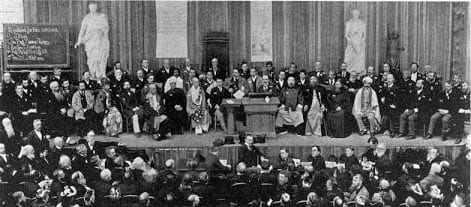
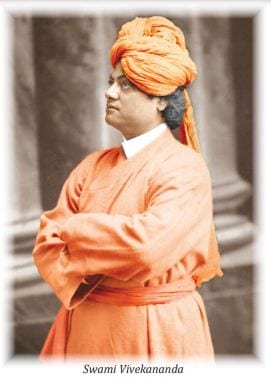
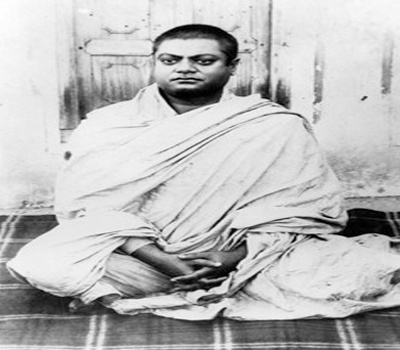

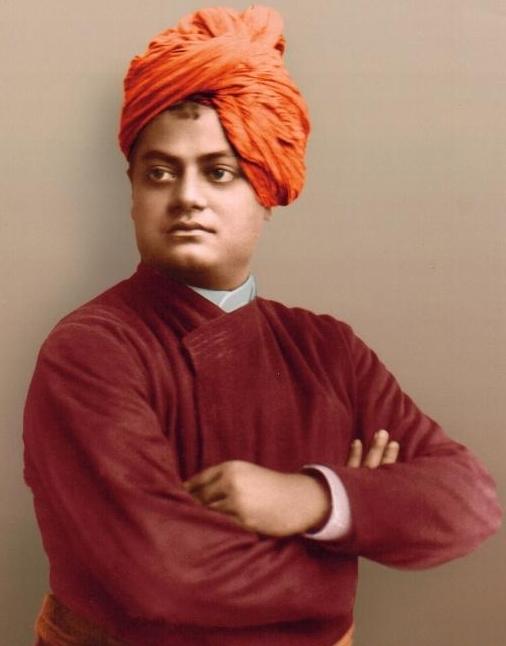
Leave A Comment